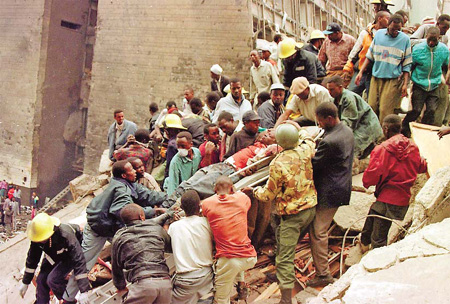Background
Bin Laden's journey to fanaticism, terror
(China Daily)
Updated: 2011-05-03 10:29
 |
Large Medium Small |
|
 Rescuers work to help survivors amid the devastation brought in by a bomb explosion in al-Qaida's first major international attack near the US embassy and a bank in Nairobi on Aug 7, 1998 that killed at least 60 people, including eight US citizens. [Photo/AFP] |
|
 |
Bin Laden was born in Saudi Arabia in 1957. He became known as the most pious of the sons among his wealthy father's 54 children.
Bin Laden's path to militant Islam began as a teenager in the 1970s when he got caught up in the fundamentalist movement then sweeping Saudi Arabia.
He was a voracious reader of Islamic literature and listened to weekly sermons in the holy city of Mecca.
 |
Thin, bearded and over 1.8 meters tall, bin Laden joined the Afghans' war against invading Soviet troops in the 1980s and gained a reputation as a courageous and resourceful commander. Access to his family's considerable construction fortune certainly helped raise his profile among the mujahedeen fighters.
At the time, bin Laden's interests converged with those of the United States, which backed the "holy war" against Soviet occupation with money and arms.
"When we buy American goods, we are accomplices in the murder of Palestinians," he said in one of the cassettes made of his speeches from those days.
A seminal moment in bin Laden's life came in 1990, when US troops landed on Saudi soil to drive Iraq out of Kuwait.
Bin Laden tried to dissuade the government from allowing non-Muslim armies into the land where the Prophet Muhammad gave birth to Islam, but the Saudi leadership turned to the United States to protect its vast oil reserves.
When bin Laden continued criticizing Riyadh's close alliance with Washington, he was stripped of Saudi citizenship.
Abdel-Bari Atwan, editor of Al-Quds al-Arabi, London-based newspaper, spent 10 days with bin Laden in an Afghan cave in 1996.
He said bin Laden and his followers never feared death.
"Those guys spoke about death the way young men talk about going to the disco," Atwan said.
"They envied those who fell in battle because they died as martyrs in God's cause."
Still, bin Laden had a knack for staying alive.
After being kicked out of Saudi Arabia, bin Laden sought refuge in Sudan. The African country acceded to a US request and offered to turn bin Laden over to Saudi Arabia in 1996, but his native country declined, afraid a trial would destabilize the country.
Back on familiar terrain in Afghanistan, bin Laden and his al-Qaida network prepared for the holy war that turned him into Washington's No 1 enemy.
When the Taliban - who would eventually give him refuge - first took control of Kabul in September 1996, bin Laden and his Arab followers kept a low profile, uncertain of their welcome under the new regime.
Al-Qaida's first major strike after bin Laden returned to Afghanistan was on Aug 7, 1998, when twin explosions rocked US embassies in Kenya and Tanzania. Most of the victims were African passers-by, but the bombings also killed 12 Americans.
Days later, bin Laden escaped a cruise missile strike on one of his training camps in Afghanistan launched by the United States in retaliation.
Since the Sept 11, 2001, attacks on the United States, bin Laden stayed a step ahead of the dragnet - perhaps the largest in history for a single individual.
As the Taliban quickly fell under pressure of the US bombardment, bin Laden fled into the inhospitable mountains in the seam that separates Pakistan and Afghanistan, keeping up a spotty stream of chatter to warn his Western pursuers of more bloodshed.
Through it all, bin Laden vowed repeatedly that he was willing to die in his fight to drive the Israelis from Jerusalem and Americans from Saudi Arabia and Iraq.
"America can't get me alive," bin Laden was quoted as saying in an interview with a Pakistani journalist conducted shortly after the US invasion of Afghanistan.
| 分享按钮 |